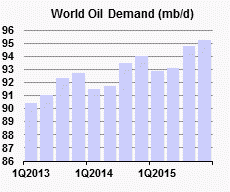Global Oil Demand Forecast Is Down On Weaker-Than-Expected Second Quarter And Sluggish Global Economy

Global oil demand will rise less than previously expected this year and next, due to weaker economic growth in developing economies and a slightly shrinking appetite in western countries, the International Energy Agency said Tuesday. The energy watchdog, based in Paris, lowered its demand growth forecast for 2014 to 1 million barrels a day, down 180,000 barrels a day, in part because of lower-than-expected deliveries in the second quarter, the Wall Street Journal reported.
"Remarkably low oil deliveries in both Europe and North America helped slash this report's estimate of global demand growth for the second quarter of 2014 to less than 700,000 barrels a day year-over-year -- a low of more than two years," the IEA said in its monthly oil market report. The IEA also cited the weaker global economic outlook in lowering its demand forecast for 2014. The International Monetary Fund, a lending organization, last month reduced its projections for global growth in 2014 by 0.3 percent to 3.4 percent growth, reflecting a slower economic recovery in the United States, Russia and several emerging markets.
But sluggish economies aren’t the only reason demand is dropping. Fuel efficient technologies and designs in some cases are enabling engines to get more mileage out of each drop of petroleum. In the aviation industry, for instance, fuel efficiency improved by 11 percent from 2005 to 2013, the International Air Transportation Association’s statistics report released Tuesday said.
Oil demand forecasts for 2015 are down slightly compared to previous projections. The IEA says global demand could accelerate to 1.3 million barrels a day next year -- about 100,000 barrels a day less than it expected in its July oil report.

© Copyright IBTimes 2024. All rights reserved.











